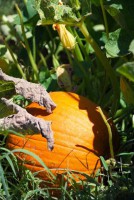Early Pumpkin Ripening

Ideally, pumpkins should be harvested when fully mature, with a deep orange color and hardened rind. However, as long as pumpkins have started to turn color, they will ripen off the vine if held under the proper conditions. While not ideal, this may be preferable to leaving them in the field if conditions are not favorable.
If necessary, pumpkins can be ripened in a well-ventilated barn or greenhouse. The best temperatures for ripening are 80-85 degrees Fahrenheit with a relative humidity of 80-85%. Night temperatures should not drop below the sixties. Even if pumpkins are ripe, a period of curing can improve storage life. The curing period should be about 10 days. During this process, the fruit skin hardens, wounds heal and immature fruit ripens all of which prolongs the storage life. Pumpkins should be stored in a cool, dry place. Ideal temperatures are between 50 F and 60 F and relative humidity of 50 - 70%. Higher humidity allows condensation on the fruit with risk of disease, and lower humidity can cause dehydration. Higher temperatures increase respiration and can cause weight loss. Temperatures lower than 50 F cause chilling injury. In a greenhouse, temperature can be managed with ventilation on sunny days. Unless it is quite cool, heat is not likely to be needed if the house is closed up at night.
Often it is not feasible to harvest pumpkins early and store them until they can be marketed, and so they must be stored in the field. If vines and fruit are healthy, storage in the field can be successful for a few weeks. If the vines die back, damage to the fruit from sun, disease and insects is more likely. In any case, it is important to scout for insects feeding on the fruit and handles, which may include squash bug nymphs or adults, or striped cucumber beetle. Control them if damage is evident. In fields that have a history of Phytophthora blight, Fusarium fruit rot, or black rot, field storage may increase the incidence of these problems, particularly if we have a period of wet weather or a major storm while fruit is sitting in the field. This has been one of the causes of significant losses in recent years, and one reason that we recommend bringing fruit in as soon as it is mature.

Upcoming Events
2025 Berry Twilight Meetings
July 2, 2025 : Berry Twilight Meeting at Dressel Farms
New Paltz, NY
Join Heather Kase, CCE ENYCHP, and Anna Wallis, Cornell IPM, for seasonal updates on berry pest man-agement and IPM.
July 16, 2025 : Berry Twilight Meeting at Samascott Orchards
Kinderhook, NY
Join Heather Kase, CCE ENYCHP, and Anna Wallis, Cornell IPM, for seasonal updates on berry pest man-agement and IPM.
August 6, 2025 : Berry Twilight Meeting at Fishkill Farms
Hopewell Junction, NY
Join Heather Kase, CCE ENYCHP, and Anna Wallis, Cornell IPM, for seasonal updates on berry pest man-agement and IPM.
Vegetable Field Meetings with Dr. Steve Reiners
July 14, 2025 : Herkimer County - Ivan Martin's Farm
Herkimer, NY
Topics: Tomato Fertility and Mitigating Physiological Disorders; Pest Scouting, ID, and IPM Field Walk.
July 15, 2025 : Washington County - Hand Melon Farm
Greenwich, NY
Topics: Tomato Fertility and Mitigating Physiological Disorders, Tomato and Sweet Corn IPM; FSMA Water Assessments and Postharvest Sanitation
July 16, 2025 : Ulster County - Wallkill View Farm
New Paultz, NY
Topics: Tomato Fertility and Mitigating Physiological Disorders; Veg Pest Update and Management; Cornell Tomato Breeding Program and Slicer Tomato Variety Trial Tour
Champlain Valley Orchard Field Afternoon
July 17, 2025 : Champlain Valley Orchard Field Afternoon
Chazy, NY
This July ENYCHP will be hosting an orchard field afternoon highlighting Mike's research trials at Chazy Orchards.












































